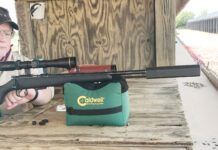
A significant court ruling happened in late December 2014, in the case of Tyler v. Hillsdale Co. Sheriffs Dept. The United States Court of Appeals for the Sixth Circuit determined that a prohibition on firearms possession for persons who have been committed to a mental institution was unconstitutional. In its opinion, the court examined the Gun Control Acts categorical prohibition on firearms possession for persons who have sought or received mental care.
In this case, the ban applied to an individual who had been committed 28 years earlier and had no viable option for seeking restoration of his rights. In its decision, the court wrote, The governments interest in keeping firearms out of the hands of the mentally ill is not sufficiently related to depriving the mentally healthy, who had a distant episode of commitment, of their constitutional rights.
According to court documents, Clifford Tyler is a 73-year-old man who does not currently suffer from mental illness and has no history of violence, unlawful behavior, or substance abuse. In 1985, when Tyler was 45 years old, his then-wife of 23 years left him for another man, depleted his finances, and filed for divorce.
Understandably, Tyler became distraught and suicidal, and he was involuntarily committed by a Michigan probate court, after his daughters called police for fear of his safety. Less than a month later, Tyler was released from the facility and returned to the workforce for nearly two decades. A psychologist who evaluated Tyler in 2012 determined the 1985 commitment appeared to be a brief reactive depressive episode in response to his wife divorcing him.
The court found that as applied to Tyler, the law was not narrowly tailored. The court also reasoned that Congress did not intend for all previously committed people to lose their Second Amendment rights for life.
The Law Behind Sandy Hook Suit. You may also have heard that in December, nine families of victims killed at Sandy Hook Elementary School in 2012 and one survivor filed suit against Bushmaster Firearms International, Camfour, a firearms distributor, and Riverview Gun Sales, a gun shop located in East Windsor, Conn. that sold the rifle to Nancy Lanza. The main legal issues underlying the suit deserves some explanation. A 2005 federal law called the Protection of Lawful Commerce in Arms Act (PLCAA) shields gun manufacturers from most lawsuits. An exception in the PLCAA allows one party to be held liable for entrusting a dangerous product to another party, who then causes harm to someone else, a third party. This negligent entrustment is the main basis for the suit. Big problem in the theory: The Sandy Hook AR-15 was purchased legally by the gunmans mother, who was shot and killed before the attack on the school. We dont see how a manufacturer, distributor, and retailer can be penalized for selling a lawful product to a qualified, legal buyer.

















